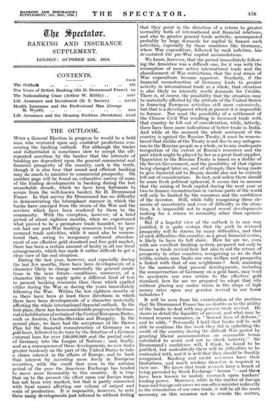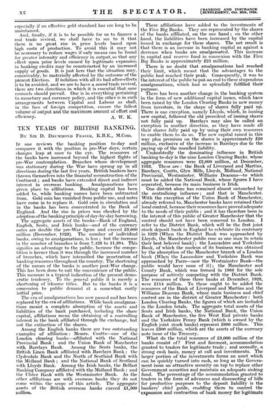THE OUTLOOK.
WITH a General Election in progress he would be a bold man who ventured upon any confident predictions con- cerning the banking outlook. For although the trader and industrialist is sometimes slow to accept the oft- repeated assertion by the banker that the interests of banking are dependent upon the general commercial and financial prosperity of the country, such is the truth, though it is also true that sound and efficient banking may do much to minister to commercial prosperity. On another page will be found an exhaustive survey of some of the leading developments in banking during the last remarkable decade, which we have been fortunate to secure from the well-known banker, Sir D. Drummond Fraser. In that survey Sir Drummond has no difficulty in demonstrating the triumphant manner in which the banks have emerged from the strain of the War and the services which have been rendered by them to the community. With the exception, however, of a brief period of about eighteen months, when we experienced what proved to be a premature trade boomlet, we have not had our post-War banking resources tested by pro- nounced trade activities, while it must also be remem- bered that, owing to temporary enforced abandon- ment of our effective gold standard and free gold market, there has been a certain amount of laxity in all our fiscal arrangements, which has made it rather difficult to get a clear view of the real situation.
.During the last year, however, and especially during the last few months, there have been developments of a character likely to change materially the general condi- tions in the near future—conditions, moreover, of a character likely to apply quite a different kind of test to present banking resources than those which applied either during the War or during the years immediately following the War. Within the last eighteen months or so there have been at least three directions in which there have been developments of a character materially affecting the whole international financial outlook. In the first place, there has been considerable progress in the finan- cial rehabilitation of certain of the Central European States, such as Austria, Czecho-Slovakia and Hungary. In the second place, we have had the acceptance of the Dawes Plan for the financial reconstruction of Germany on a gold basis, followed in its turn by the flotation of a German external loan for over £40,000,000 and the partial entry of Germany into the League of Nations ; and, finally, arid as a consequence of these developments, we now find a greater tendency on the part of the United States to take a closer interest in the affairs of Europe, and to back that interest by investing more freely in European securities, with the result that even in the autumn period of the year the American Exchange has tended to move more favourably to this country. It is true that up to the present the effect upon our foreign trade has not been very marked, but that is partly connected with local causes affecting our volume of output and costs of production. It is impossible, however, to note these many developments just referred to without feeling that they point in the direction of a return to greater normality both of international and financial relations, and also to greater general trade activity, accompanied probably by large demands for capital to finance such activities, especially by those countries like Germany, where War expenditure, followed by rank inflation, has devastated the pre-War capital accumulations.
We know, however, that the period immediately follow- ing the Armistice was a difficult one, for it was with the resumption of more active international trade and the abandonment of War restrictions, that the real strain of War expenditure became apparent. Similarly, if the financial reconstruction of Germany leads to greater activity in international trade as a whole, that situation is also likely to intensify world demands for Credits. There is, of course, the possibility that the situation may be materially affected by the attitude of the United States in financing European activities still more extensively, but that is a development which at present it is impossible. to foresee. Nor must the possibility of a settlement of the Chinese Civil War resulting in increased trade with that country be left out of consideration, while, latterly, there have been more indications of better trade in India. And while at the moment the whole sentiment of the country is against the Russian Treaty, it must be remem- bered that dislike of the Treaty is not due to any antagon- ism to the Russian people as a whole, or to any inadequate recognition of the extent of Russia's resources and the part which might be played by her as a great food supplier. Opposition to the Russian Treaty is based on a dislike of the Soviet Government, and the possibility of that regime being changed later on, and of attempts then being made to give financial aid to Russia should also not be entirely left out of consideration. In fact, and unless there should be some fresh political upheaval, it seems fair to assume that the raising of fresh capital during the next year or two to finance reconstruction in various parts of the world will only be limited by the resources and the confidence of the investor. Still, while fully recognising these ele- ments of uncertainty and even of difficulty in the situa- tion, it is impossible not to regard recent developments making for a return to normality other than optimis- tically. But if a hopeful view of the outlook is in any way justified, it is quite certain that the path to restored prosperity will be strewn by many difficulties, and that of such difficulties this country, as a great financial centre, is likely to have its full share. How far are we, even with our excellent banking system, prepared not only to finance a trade revival here but also to aid the return of prosperity in other countries, recognizing as we do that within certain sane limits our own welfare and prosperity is linked with that of our neighbours ? And, assuming for the moment that present developments, including the reconstruction of Germany on a gold basis, may tend to accelerate our own return to the effective gold standard, how far are we prepared to adopt that role without placing any undue strain in the shape of high money rates upon any genuine revival in our home industries ?
It will be seen from his examination of the position that Sir Drummond Fraser has no doubts as to the ability of the banks to deal with any genuine trade revival. He shows in detail the liquidity of present, and what may be termed reserve resources, or "Second lines of defence," and he adds, "Personally I hold that banks will be well able to continue the fine work they did in upholding the credit of the country during the difficult War period by granting liberal accommodation on reasonable terms calculated to assist and not to check industry." Sir Drummond's confidence will, I think, be found to be justified, but undoubtedly there will be difficulties to be contended with, and it is well that they should be frankly recognized. Banking and credit resGurces have their limitations, and much wisdom therefore is required in their use. We know that trade revivals have a knack of being preceded by Stock Exchange " booms "—and these have been known to unduly encroach upon bankers' lending power. Moreover, while in the matter of foreign loans and foreign advances we can often minister indirectly to the stimulation of our own trade, it will be all the more necessary on this occasion not to overdo the matter, especially if an effective gold standard has ere long to be maintained.
And, finally, if it is to be possible for us to finance a real trade revival, we shall have to see to it that there is no great rise in price levels based upon high costs of production. To avoid this it may not be necessary to reduce wages if only means can be found for greater intensity and efficiency in output, so that any effect upon price levels caused by legitimate expansion in banking credits may be counteracted by an increased supply of goods. It is just here that the situation may, conceivably, be materially affected by the outcome of the present Election. If inflation with all its bad after-effects is to be avoided, and we are to have a sound trade revival, there are two directions in which it is essential that sane counsels should prevail. One is in everything pertaining to monetary and currency policy, and the other is in such arrangements between Capital and Labour as shall, in the face of foreign competition, ensure the fullest volume of output and the maximum amount of effort and



























































 Previous page
Previous page